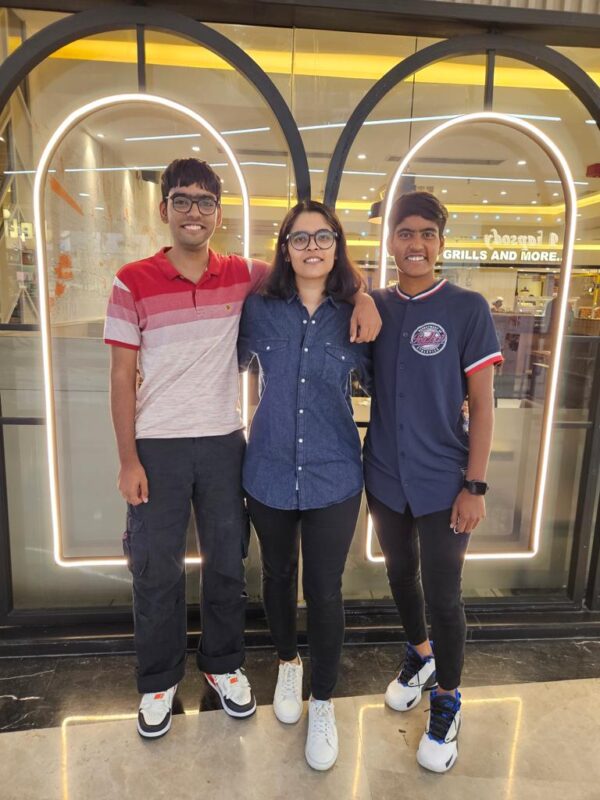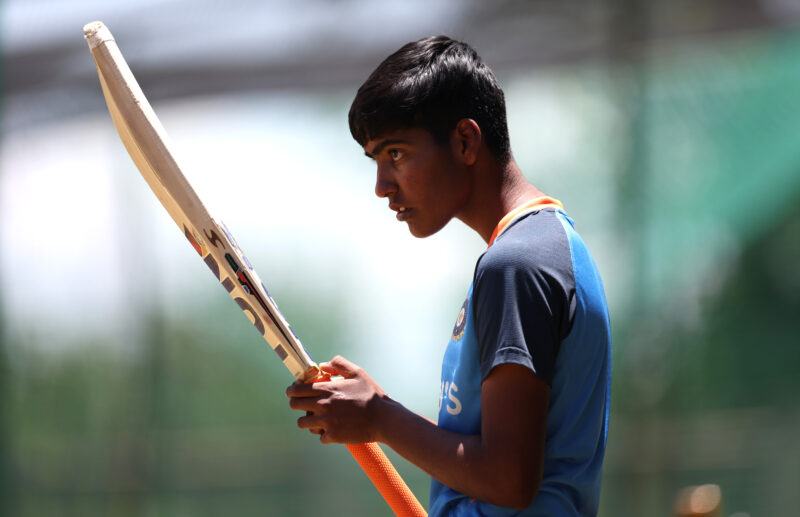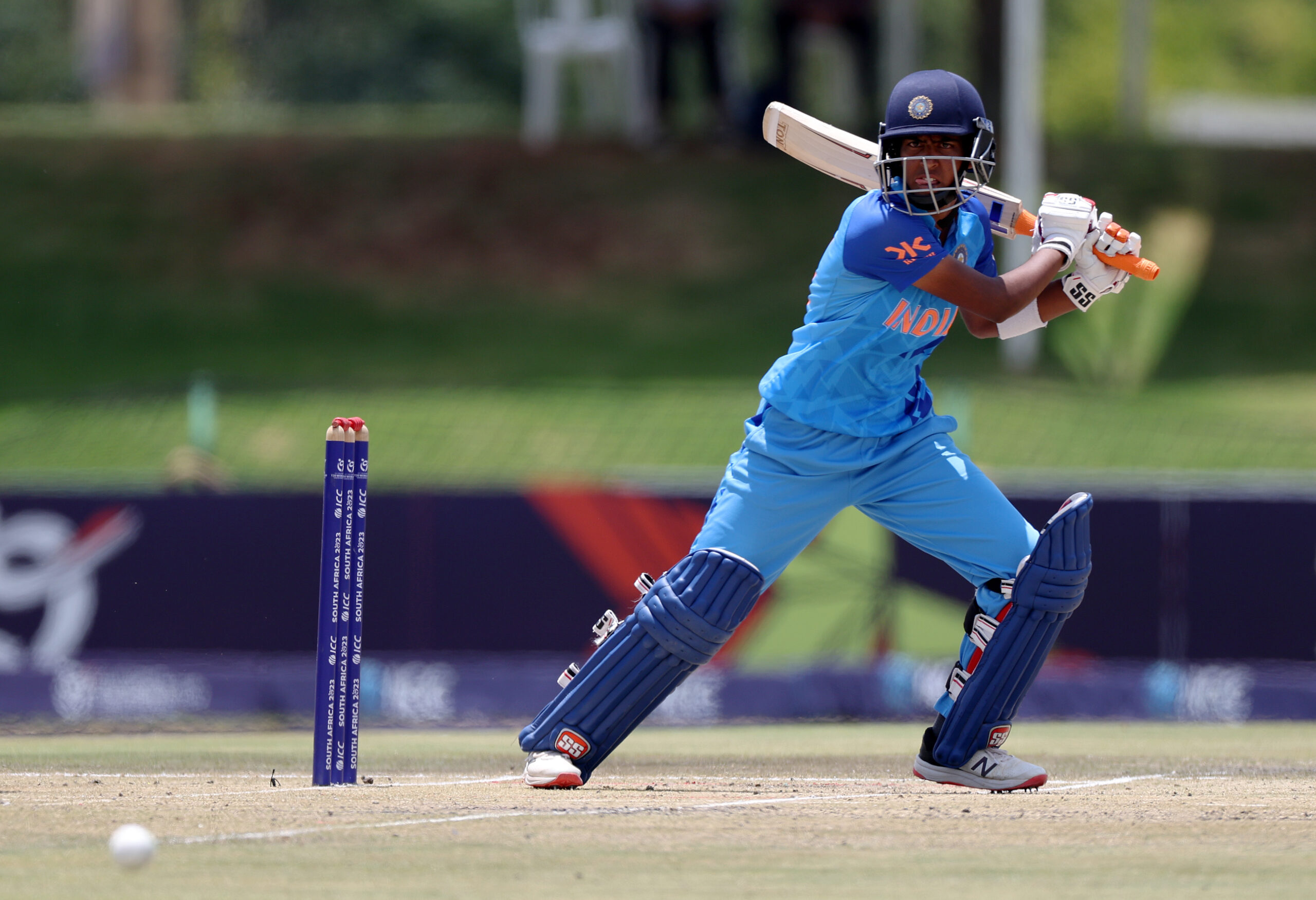Rising women’s cricket star, Shweta Sehrawat, who led India under-19 to Emerging Teams Asia Cup title win in Hong Kong last month after being part of India’s under-19 World Cup triumph in January, credits her sister for showing her the way to the cricket field.
Over a decade ago, Swati Sehrawat, a class ninth student then at Poorna Prajna Public School and an electronics/communication engineer by profession now, had taken up cricket, enrolling herself at the Aravalli Cricket Academy, close to where her family stayed. Swati had also started to attend renowned club, Sonnet, to double the efforts.
But as luck would have it, an arm injury in class 10th while competing in judo, another sport she had picked, stalled her progress in cricket as did her good academic record which prompted her to take science in class 11th and focus entirely on studies.

But that one-and-a-half years spent in cricket did have a pleasant after-effect. Her sister Shweta, seven years her junior, took to it and excelled.
“My inspiration was my sister. She used to play and I would watch her and soon started playing cricket. I used to go to the academy with my sister and mom along with our brother, Samaksh,” says Shweta, who top-scored in India’s under-19 World Cup win in South Africa in January with 297 runs in seven matches.
The right-handed batsman couldn’t do much with the bat last month in Hong Kong since three of India’s five matches, including the semi-final against Sri Lanka, were abandoned without a ball bowled.
Yet, the title win has been sweet as it has buttressed her position as a future India senior star, something she returned with from South Africa.
Shweta, who admires Smriti Mandhana, Harmanpreet Kaur, Beth Mooney, Alyssa Healy and Tahlia McGrath, looks back at the under-19 World Cup experience with fondness.
“The experience was good. Got to learn a lot there, how to build innings and how to finish the game. I got to know about the shots and other aspects of my game. It was a great experience not just for me but for the team. We had prepared for eight months in camp for this tournament. The bonding was great,” she explains.
Success in recent times has brought recognition, besides the weight of expectations.
“There have been many changes. People have begun recognising me. Also, more people now know that women’s cricket is there and kids also play. I have seen many girls joining academies. This has changed over the last two years,” she explains.
“The numbers also increased after we returned from South Africa. There are girls who we see in some academies nowadays who weren’t there earlier.”
Shweta was, however, luckier than sister Swati. While injury and inclination towards academics were the primary reasons, lack of opportunities for women in cricket back in the day didn’t encourage the elder one to push hard at cricket and fight the odds.
“At my time, there weren’t many opportunities. Women’s cricket was still growing. If I had taken it as a career, maybe I would have got a chance [only after] reaching this age. But I have my own career now. I am working in a company as an engineer,” says Swati who also revealed that constant talk of cricket in family was what initiated her to go into cricket.
“Cricket used to be discussed a lot in our homes. Mother and father used to watch cricket. We thought that since cricket is popular and women’s team is improving, why not pick it. That is why I joined. I had a good hand in other games too. When I was in 10th, my arm was injured while I was competing in judo. That is why I left almost every sport. And in 11th I took up science because I wanted to study engineering. So, there was no coming back to sport.”
But soon after Swati left cricket, the family put Shweta into the hands of renowned Delhi coach and ex-first class cricketer Ragini Malhotra at the academy in Jesus and Mary College.

“She came to me when she had just entered middle school. She was very enthusiastic, said that she can bat, ball and keep wickets. She had great interest in cricket. We streamlined her. We got her school changed too,” says Ragini.
Shweta was admitted to Modern School, Barakhamba Road in class eighth.
“Modern School has a team. At that time, there were no tournaments for women and girls. Now, at least there are some tournaments. There were no school teams then either. You would give trials for Delhi and District Cricket Association (DDCA) and get selected. That alone would guarantee cricket. If you weren’t, then you were wasted and had little chance of playing competitive cricket,” explains Ragini.
“So, the thinking was that if you get into a school which has a team, you will stay in practice with the team throughout and then you will also play for the school team. That was the reason why she was shifted.”
There are only a handful of schools that have a women’s cricket team and they can be counted on fingers like Modern, a couple of branches of DPS among others. Also, there are no dedicated academies for women cricketers in Delhi.
At JMC, she was given the opportunity to do all the tasks.
“We would tell her, okay you are enjoying wicketkeeping. Do it. You are enjoying bowling, bowl. Don’t do both things at a time, do only one thing. We saw calibre, her interest and capability,” explains Ragini who used to give free coaching to the girls back then.
“I got her started playing matches with the boys. She gradually improved.”
Priyanka Sisodia, the head of sports at Modern School, says, “Girls generally don’t get to practice as a team. When they are going to practice in an academy, they play with the boys there. But here she would turn up at girls’ team practice at 6.30 am. Thereafter, in the evenings she’d go to JMC.”
It gave her the chance to lead the school.
“Modern has been winning IPSC (Indian Public Schools Conference) under-19 women’s tournament for some time now and Shweta has led the school lately. Before coming here, she had played schools nationals but after joining Modern she got to play Delhi and District Cricket Association (DDCA) cricket,” said Priyanka, who joined the school in 2009 and is a former Delhi player. She also ensured fees concession to Shweta.
“The advantage she got playing for the school as the best player was immense. If she were to go with the state team, then she wouldn’t get the responsibility there which she got with the school team. If you get more responsibility, you do better. Here I made Shweta open the innings and open bowling too. She would stand at cover when she was young. So when she played for Delhi, she was already exposed and had confidence and that got reflected in the state team.”
But there is one that she needs to work on, according to Ragini.
“She is shy and needs to be expressive.”
Shweta has now shifted to Capital’s Karnail Singh Stadium for practice under ex- cricketer Dipti Dhyani, who has represented an India women’s junior team. She is likely to join Railways as an employee.
Hopes of India colours
The target, however, remains a place in the Indian team.
“There is the upcoming ODI World Cup in 2025 which will happen in India. I want to play that Cup. I have to perform at the domestic level and do the best I can to reach the team,” says Shweta.
Being an opener and with an approach towards batting that “is very aggressive”, she says she “likes to score more in lesser number of balls”.
But competition in the team is very high. Smriti and Shafali Verma are already well established at the top.
“You have to be flexible for the team. The more flexible you are, the better it is for you. Whenever I get the opportunity, I will enthusiastically be part of the composition from which the team is benefitting the most. Yes, I am willing to bat anywhere.”
Ragini, who was the coach of the team Shweta led in BCCI’s women’s under-19 Challenger Trophy last year says she reads the game very well.
“She cannot play under pressure. She restricts herself under pressure. She should be allowed to play bindaas (with freedom) and in that, she performs well. She thinks about how to play, who to bowl at what point. She was made captain in under-19 challenger last year. I noticed that she was doing things even before we [as coaching staff] could convey what we were thinking. She reads the game well.”





